アイルランド大学ダブリン校での講義録
2023年04月22日
いよいよ、最後の「連載」となった。
欧州、アイルランドへのサバティカルを機に編集部よりスペースはいただいたものの、生来の遅筆と慣れない外国での生活、加えて初めての外国での取材の難しさに十分に記事を書けなかったことを、お詫びしたい。
本務校と受入先校の理解をえて、あと1年、ダブリンに滞在させていただくことになり、トルコやギリシア、スイス、スペインなど今年行われる各国の選挙の様子もお伝えできればと思っていたのだが、サイトの閉鎖と共に連載も終了することになり、残念に思う。成果は別の形でご披露させていただきたい。
今回は最後ということで、現在、客員教授をさせていただいているUCD(University College Dublin/アイルランド国立大学ダブリン校)で、現地の学生諸君におこなった私の日本政治についての講義を掲載させていただきたい。私がこの1年、欧州に滞在する中で見えてきた日本政治の姿をアイルランドの学生たちに伝えたものである。私がダブリンの学生たちに通信する日本政治という点では、連載のタイトルからもそれほど外れてはいないだろう。
講義は、UCD全学学部生を対象とした「Gateways to Japan(ゲートウェイ・トゥー・ジャパン、日本への扉)」という講座の中でおこなった。この講座は私もお世話になっているUCD日本研究センター(センター長:小舘尚文准教授、副センター長Emma Sokell教授)のスタッフが中心になって運営しているものだ。
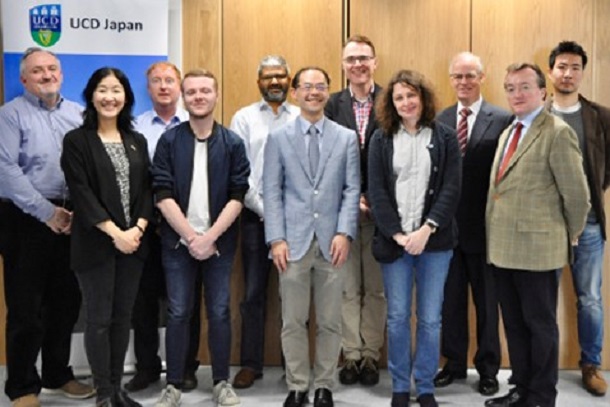 UCD日本研究センターのメンバー。UCD日本研究センターのメンバー。中央に小舘センター長、その右がSokell副センター長
UCD日本研究センターのメンバー。UCD日本研究センターのメンバー。中央に小舘センター長、その右がSokell副センター長世界的な潮流ではあろうが、1980年代、90年代までは盛んだった日本研究も、21世紀に入ると、日本食やポップカルチャーへの関心が高まるのと裏腹に、日本経済の停滞と共に下火となっている。一方、パンデミックが生じるまでは、中国が欧州でも各国のアジア研究機関に対して資金援助や人材派遣などを戦略的に行い、研究面においても各地を席巻してきた。アイルランドの名門とされるダブリン大学トリニティカレッジ(TCD)にはアジア研究所が設置され、中国関連のイベントが多く開催されている。UCDにも2006年には孔子学院ができるなど中国が「進出」している。
しかし、UCDでは日本のカルチャーへの関心の高い学生たちを中心にUCD日本ソサイエティというサークルが2010年にでき、UCDで20年以上日本語を教える伊地知伸子氏を中心とした日本和太鼓チームも結成された。
UCD日本ソサイエティは現在500名近くの学生が参加しているが、2016年には大学スタッフもUCDジャパンというグループを作り、それが2020年4月の日本研究センターの立ち上げにつながっていった。同センターは欧州において稀有な存在となりつつある日本に特化した研究センターで、日本語能力試験の実施や外国青年招致事業(Japan Exchange and Teaching Program、JET)プログラムの紹介、日本関連セミナーの開催を通じて、日本とアイルランドの具体的な架け橋としても機能している。
また、日本研究センターのメンバーであるHugo O’Donnell氏が中心となって、毎年4月に「エクスペリエンス・ジャパン」という大規模イベントが開催されている。これは、ダブリン北西のフェニックスパークにあるアイルランドの迎賓館「ファームリーハウス」で花見フェスティバルとして行われるもので、エクスペリエンスの名前通り、日本を体験してもらう様々な催しが目白押しとなっている。
中でもUCDで誕生した太鼓チームはエクスペリエンス・ジャパン・太鼓チームとしてステージで華麗なバチ捌きを披露し、参加しているダブリン市長やアイルランド政府代表(例えば、現在首相を務めるLeo Varadkar)はじめ、多くの来訪者を感動させている。
ブレグジットによってEUからイギリスが離脱し、EU内の英語国がアイルランド(とマルタ)のみになっている現状を鑑みると、カトリック教徒のための大学として創設された歴史をもつUCDにある日本研究センターは、我が国の「パブリック・ディプロマシー」の戦略的拠点となりうる資産である。
本講座は、そのUCD日本研究センターの活動の中核にあたるもので、日本に関心を持つ学生にさらなる情報・知識を提供し、交換留学や日本語学習の促進、さらには、将来の日本とのビジネスや研究交流を推進する人材育成に貢献するものだ。
本年度の講座は毎週月曜日に2時間、2コマ(1コマ、1時間)を使って、オムニバス形式で行われている。元駐日アイルランド大使のJohn Neary氏による「東洋と西洋、態度や外交の違い(Difference in Western/Eastern manners, diplomacy )」や小学館取締役で全世界で人気のポケットモンスターのメディアミックス展開の仕掛け人でもある久保雅一氏による「ニューノーマル時代の日本アニメ」といった現場感覚に溢れた講義もあれば、令和2年に日本とアイルランドとの相互理解の促進を理由に外務大臣表彰を受けたUCD歴史学科Declan Downey専任講師の重厚な日本史の講義などバラエティに富んだ構成となっている。
私が講義をおこなったのは2月20日だった。この時期、アイルランドでは欧州ではラグビーのシックスネーションズが始まっており、大いに盛り上がっていた。そこでタイトルはアイルランドのラグビーのナショナルアンセム「Ireland’s Call アイルランズ・コール(アイルランドからの呼びかけ)」に引っ掛けて、「Japan’s Call – how we have answered, and how we will answer (ジャパンからの呼びかけ:我々はいかに答え、これから答えていくのか)」とした。日本政治が近代において何と戦ってきたのか、そしてこれから何と戦おうとしているのかを、日本のメディアやジャーナリズムについても触れつつ、アイルランドの若者にも理解可能なように話してみたものだ。講義は英語で行ったが、日本語に翻訳している。
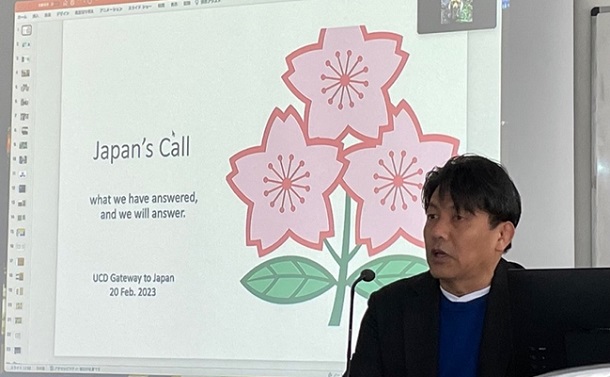 講義をする筆者。英語の講義は難しいが、学生からは明るい反応もあり、好評だった?
講義をする筆者。英語の講義は難しいが、学生からは明るい反応もあり、好評だった?なお講義の最後の部分に新しい日本の闘い方のモデルとして、ラグビーの日本代表を上げた。その際、翌3月に高校のジャパン代表が来て、アイルランドの若者と戦うので、ぜひ新しいジャパンの闘い、未来のジャパンの姿を見にきてくれと学生らには呼びかけた。
大見えをきった手前、やや心配ではあったが、やってきた高校生らは世界で最も古いクラブチームでもある名門トリニティ大学のラグビークラブを55対26のダブルスコアで撃破、続いて2回おこなわれたアイルランドの19歳以下のナショナルチームとの闘いも、初戦は22対19で勝ち、2回戦は44対45で敗れた。わずか1点といえども負けは負けだが、欧州のナンバーワンを決めるシックスネーションズではアイルランドはフル代表も20歳以下のチームも全勝で勝利するなど、現在、世界一のラグビー大国である。その世界の大国に土をつけ、トータルとしては勝ち越した高校ジャパンは、「シックスネーションズじゃなくて、セブンネーションをやろう。我々には君たちが必要だよ」などと試合を見にきたアイルランドの観客にも大いに讃えられた。
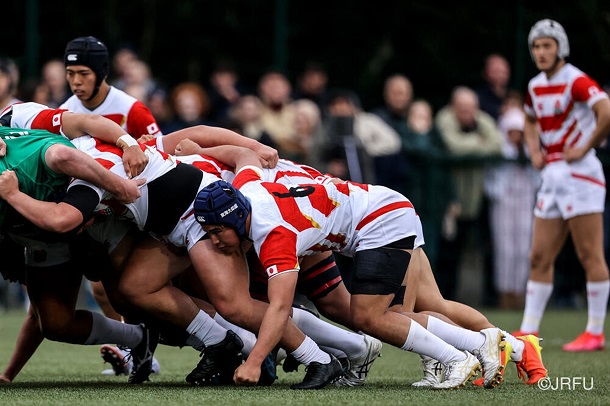 アイルランドU19と戦う高校ジャパン=日本ラグビー協会ホームページより
アイルランドU19と戦う高校ジャパン=日本ラグビー協会ホームページより筆者は高校ジャパンの遠征を、現地で通訳などのお世話をするリエゾンチームの一員として近くで見つめたが、ダイバーシティに富んだ高校ジャパンは、みんな晴れやかに楽しく声を出し掛け合って闘っていた。昔の「水を飲むな」「根性を出せ」「気合いが足りない」などの時代を知っている世代としては、その違いに大変に驚いた。
彼らは大きな情熱を胸に、熱いけど、いや熱いからこそ、合理的にクールに戦っていた。限られた時間の中で、全体を見ながらも、局面局面では激しく勝負する。視野を広くして、使えるスペースは全部使って大きく展開し、細かい仕掛けでも引っ掛ける。しっかり集団で戦いつつも、個人としていけるならどんどんと突破していく。そして、最後まで気を抜くことなく――最終試合はアイルランドのど根性relentlessに敗れたけれど――戦い続ける。
このような彼ら高校ジャパンの闘いぶりからは、単にラグビーを超えて、これからの我々が社会や国として求められる戦いのやり方を、筆者としても教えてもらった感が強い。惜しむらくは彼らの英語がもうちょっとしっかりして試合中にレフリーなどとのコミュケーションがきちんとできていれば完璧だったが、それは私を含む我々全員の課題だろう。いずれにせよ、ヨーロッパに来て1年、若い世代が与えてくれた日本への希望をもって、「ダブリン通信」の最後としたい。
筆者が2023年2月20日、アイルランド大学ダブリン校で行った講義は以下(※講義は英語で行った。本稿末尾に掲載。日本語訳は読者にわかりやすく適宜補っている)。
『日本からの呼びかけ:我々はいかに答え、これから答えていくのか』
ご紹介ありがとうございます。
こんにちは。駒澤大学法学部准教授の逢坂巌と言います。日本の南の島、九州出身です。20歳の時に東京にいって早稲田大学を中退し、少しビジネスの経験を積んだあと、東京大学に入り直して大学院に進み修士号を取りました。その後、助手になるように勧められて博士課程を辞め、東大の公共政策大学院で教員としてのキャリアを始め、立教大学を経て、現在は駒澤大学の准教授です。著作は「日本政治とメディア」(中央公論新社)、共著に「テレビ政治」(朝日新聞出版社)や「政治学」(東京大学出版会)などがあります。日本では時々、新聞やテレビなどでもコメントを行っています。
ご紹介があったように、実はアイルランドは2度目です。ここには40年前にきて、ラスガー(Rathgar)に2ヶ月ほどに住んで、それからロンドンの地元の中学校に通いました。父・収は九州大学で英文学を研究しており、彼がサバティカルに家族を伴ったので、私もついてきたのです。父はアイルランド出身の英文学者や詩人、劇作家に興味があり、日本のイエイツ協会の創始にも関わったらしいです。ブレンダン・ビーアン(Brendan Behan)の「Confessions of a Irish Rebel(アイルランドの反逆者)」も日本語訳しました。彼もここUCDでサバティカルをして、そのあとロンドン大学に行きました。
私の趣味は芝居とラグビーと料理です。見たり食べたりするのも実際にプレーしたり作るのも好きです。芝居は去年8月、アイルランドの西の港町ゴールウェイ(Galway)にブライアン・フリール(Brian Friel)の「トランズレーションズ(Translations)」を見にいき感動しました。また10月にはアイルランドに住む日本語話者の人たちの劇団「Raku楽シアター」に客演参加し、ダブリンのパブの二階にある舞台にたちました
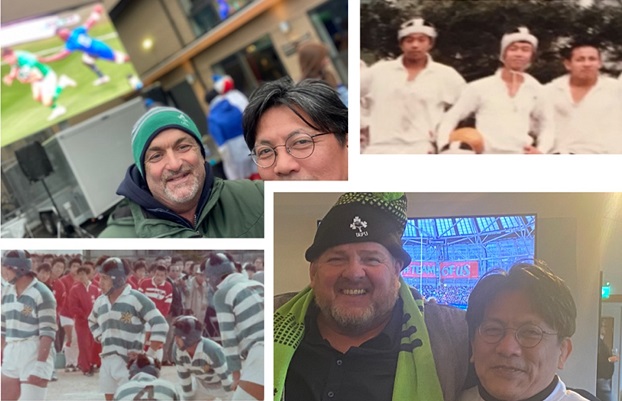 筆者は小学校から高校までラグビーをプレイした。アイルランドで試合を見にいく時はジャパンのジャージを着ていく。「おお、ジャパンか?いいチームだよな」と声がかけられ、一緒に写真を撮ろうとなる。アイルランドの人々にとって前回のワールドカップで日本に負けたことは相当のショックだったらしい
筆者は小学校から高校までラグビーをプレイした。アイルランドで試合を見にいく時はジャパンのジャージを着ていく。「おお、ジャパンか?いいチームだよな」と声がかけられ、一緒に写真を撮ろうとなる。アイルランドの人々にとって前回のワールドカップで日本に負けたことは相当のショックだったらしいラグビーは小・中・高と、途中ロンドンのクラブチームでプレーしたのも加えると10年以上やりました。今はプレーしませんが、時々世界最強のクラブチーム、レンスターの試合などを見にいっています。先々週のシックスネーションズのアイルランド対フランスの試合はアビバスタジアムのクラブハウスで見ました。
ラグビー好きや芝居好きと関係しているのでしょうが、私の専門は政治コミュニケーションで日本政治を対象に研究をしています。政治コミュニケーションとは国民とメディアと政治がどのようにコミュニケーションしているのかを観察し分析する分野です。選挙をはじめとする政治家や政党のコミュニケーション活動、世論やプロパガンダ、メディアやその影響力の分析などが対象となりますが、私は特に政治家たちがどのようにメディアや国民にコミュニケーションしているかに興味があります。
政治は人々の合意を形成する営みですが、そこには人々の権力に向けた戦いがあります。その権力は単に法律を作るにとどまらず、ジェンダーやメディアが人々の意識に及ぼす力、そして国民や有権者が政治家に行使する力などが含まれます。現代政治の権力の基盤は選挙であり、世論ですから、権力を求める人々はメディアなどを通じて支持を得ようと試み、政治家は国民の意識に対して演技をします。一方、メディアやジャーナリズムは政治家を監視し、時に批判攻撃します。私はそれらの力のやり取りを観察するのが好きです。その意味では日本政治の喧嘩ウオッチャー、芝居ウオッチャーなのかもしれません。
今日は時代を広くとって、日本政治が今まで何と戦ってきたのか、それを簡単にお話ししたいと思います。政治が闘う相手は外国と国内の課題です。そこで、ここでは日本政治の外交課題と内政の歴史、そして現在大きく変化している国民と政治をつなぐ日本のジャーナリズムについてもお話できたらと思います。
外交を考える場合は地政学的な位置が重要です。それではここで日本の位置を見てみましょう。日本はユーラシア大陸の東端にあります。東側は巨大な太平洋があります。すると、どことの関係が重要だったと思いますか?そうですね。朝鮮半島と中国大陸です。
日本については、特に中国との関係が重要でした。中国は前近代において、この地域(東アジア)の超大国・まさに中華でした。周辺の国々は軍事的に支配されたり、あるいは臣下の礼をとっていました。支配は軍事力だけによってではなく、文化的、倫理的なものでもありました。
なんと言っても中国では文明の源とも言える文字や紙などのメディアが発明され、そして儒教も発達しました。それらは日本にも大きな影響を与えました。皆さんもご存知の通り日本では漢字・平仮名・カタカナの3種類の文字を使いますが、漢字は中国文字の日本語版です。現在の中国では簡略化した文字を使っているので、古い中国文字に近いものを日本では使っています。
日本語のひらがなやカタカナも漢字から作り出されたものです。古代では日本語の音を表すのに同じ発音の漢字を使っていましたが、それを徐々に変化させて今のひらがなやカタカナになりました。また、儒教も日本に大きな影響を与えました。江戸時代の侍の倫理は儒教に基づくこととされました。東京の湯島には孔子の教えを伝える幕府の学校がありました。加えて、古代から律令制などの政治制度もいろいろと取り入れています。ただし、いずれも文字のように現地化し、日本化しているのは興味深いことです。
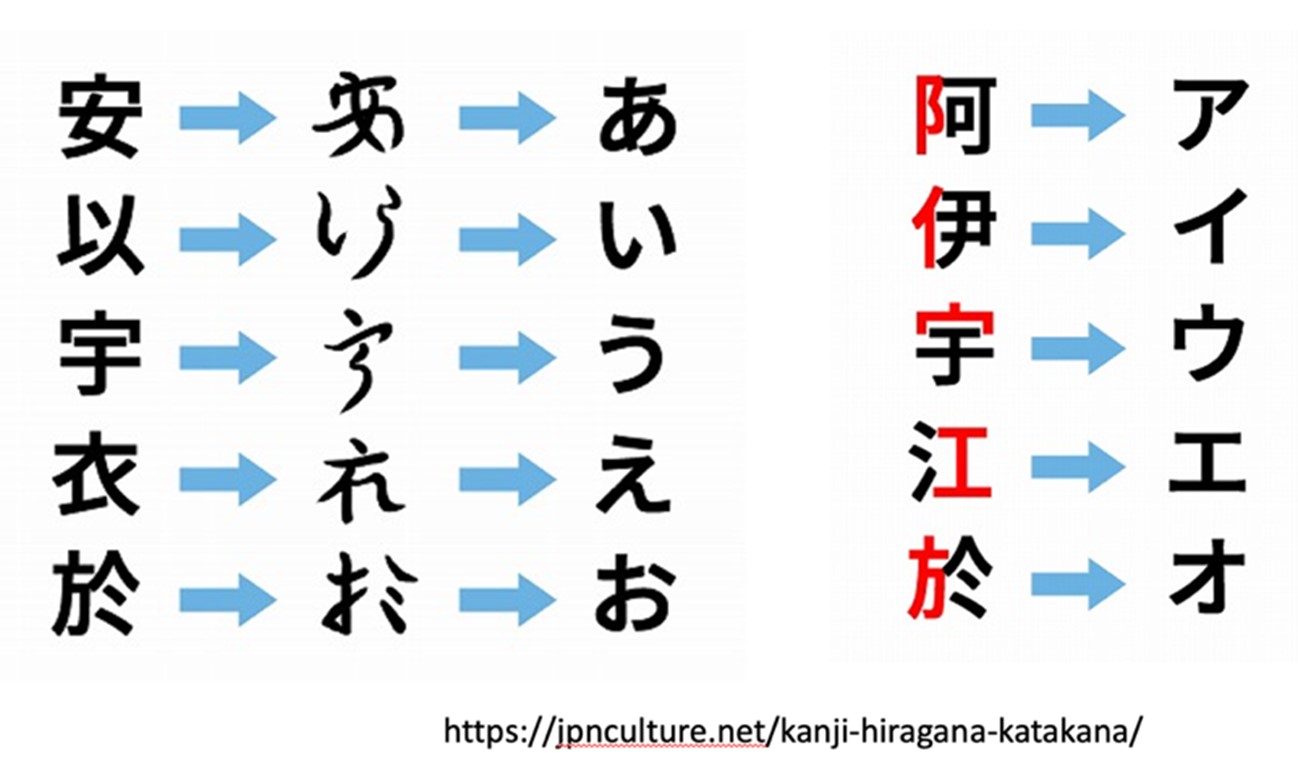
このようにさまざまな文化や政治面で日本は中国に影響され、時には足利義満のように中国と臣下の関係も結ぶこともありましたが、モンゴル大帝国の侵略は侍たちが撃退するなど、軍事的に中国には支配されませんでした。それどころか日本は時に中国に挑戦・侵略しようと試みたこともあります。中国の明代には日本の海賊たちが中国沿岸を襲い略奪を働きましたし、豊臣秀吉は15世紀中頃に日本を軍事的に統一した後、今度は中国を支配するのだと朝鮮半島に兵を出しました。結果は失敗しましたが、このように日本は時に「大中華」に臣下の礼をとり、時に自らが中華たらんと挑戦する「外交」を行なっていました。
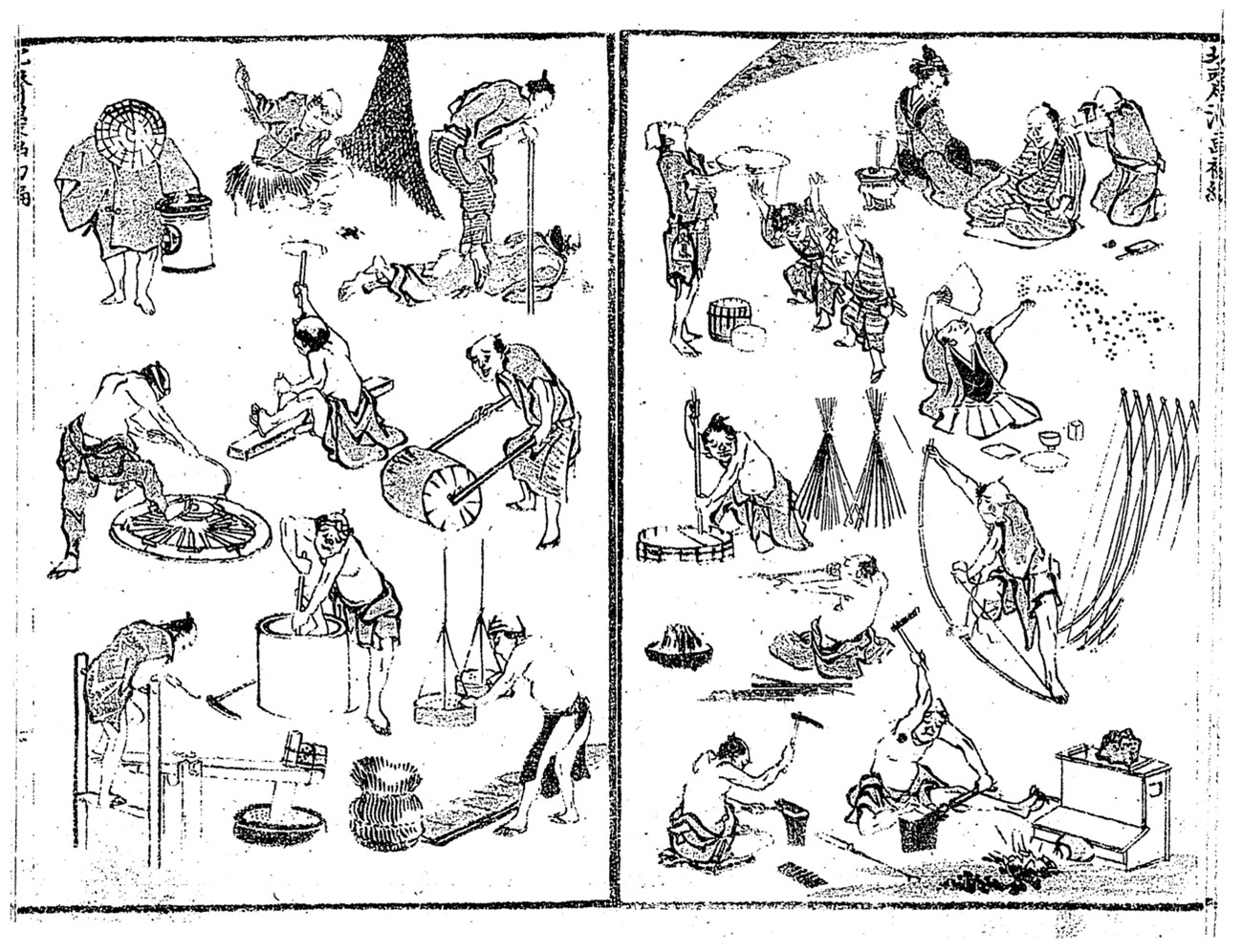 北斎漫画(葛飾北斎)近代デジタルライブラリー
北斎漫画(葛飾北斎)近代デジタルライブラリー一方、当時の中国からすると、日本は極東の「野蛮国」です。明代の百科事典にはケモノと同じ部類に裸で刀を振り回す「野蛮人」として日本人が描かれています(『鼎鋟崇文閣彙纂士民捷用分類學府全編35卷』)。実はこの裸の日本人というのはある意味で正しい描写です。次の絵は江戸時代の農民や町人などを描いた絵ですが、当時の日本人たちが半裸で仕事をしたり、暮らしていたことがわかります。この習慣は、自分の祖父らの世代には残っていたよう思います。祖父はよくステテコ一枚で涼んでいました。公共の場での裸という点では、現在でも温泉や銭湯にはみんな一緒に裸で入浴します。代表的な格闘技の相撲も裸ですし、粋な締め込み姿で肌を露出する祭りも日本各地にあります。その一つを私の故郷である九州の福岡の祭り、博多祇園山笠についての動画で見てみましょう。
非常によくまとまった動画だと思いますが、皆さんは締め込み姿をいかが感じましたか? 最後の台湾からの人が言っていた、侍の精神というか、何かしらの野蛮さや好戦性は今でも残っているのかもしれません。しかし、いずれにせよ、当時の文明国の中国や朝鮮からするとこのような裸に寛容な日本の文化は恥ずかしいこととされ、日本が劣っている、「野蛮国」の理由だとされていました。
東アジアについてはこのような国際関係が長年続いていましたが、19世紀の後半に大きな変化がありました。西洋文明との接触です。同時期、中国も西洋と接触しましたが自分達のやり方に自信がある中国が近代化に戸惑っている間に、日本は急速に近代化を達成しました。
近代の日本と戦争 Modern Japan and its war
1894 日清戦争 First Sino-Japanese War
1895 台湾植民地化 Colonized Taiwan
1904 日露戦争 Russo-Japanese War
1910 韓国併合 Colonized Korea
1914 第1次世界大戦 World War I
1931 満州事変 Invaded Manchuria
1937 日中戦争 Second Sino-Japanese War
1941 太平洋戦争 Pacific War
その後、日本は朝鮮半島の支配権をめぐって中国と戦い1895年に勝利します。このことは東アジア世界では巨大な変化でした。かつての超大国を野蛮国が打ち破ったのですから。また、1904年から1905年には日本はロシアと戦って勝利します。この勝利は東洋人が西洋人に勝利した初めてのもので、西洋の支配に苦しむアジアの人々から大いに喜ばれました。第1次世界大戦にも日本は連合国側として参戦し、中国にいたドイツ軍を打ち破っています。
しかし、日本は1910年には朝鮮を植民地化し、その後も中国北部を侵略します。1930年代には満洲国を建設し、1936年には万里の長城を超えて中国本土も侵略し始めました。少し現在のロシアの行動にも似ています。そして1941年にはアメリカとイギリス、フランスなどとも開戦します。イギリス支配のシンガポールを陥落させ、戦艦プリンスオブウェールズを撃沈するなど、緒戦は勝利しました。しかし、1945年にアメリカが世界で初めて原爆を使用して広島と長崎の街を壊滅させた直後に、日本は全面降伏をしました。
敗北後、アメリカを中心とする連合国に占領され、その中で平和的な国家としての道を歩み出します。歩まざるをえなかったとも言えます。アメリカの影響下、新しく作った憲法の第9条では、軍隊を廃止し国の交戦権も否定することも規定しています。当時、戦争に倦んだ国民はそれを支持しました。
日本国憲法第9条
日本国民は、正義と秩序を基調とする国際平和を誠実に希求し、国権の発動たる戦争と、武力による威嚇又は武力の行使は、国際紛争を解決する手段としては、永久にこれを放棄する。 ② 前項の目的を達するため、陸海空軍その他の戦力は、これを保持しない。 国の交戦権は、これを認めない。
当初はアメリカも国際連合による世界秩序を模索していたともされますが、ソビエトとの冷戦がすぐに始まります。日本は自国領土にアメリカ軍の最前線基地を作ることを認めることと引き換えに、アメリカから守ってもらうというという安全保障をえました。冷戦の進行と共に日本も「自衛隊」という軍事組織を作りましたが、あくまで自衛のためとして長距離ミサイルなどの「攻撃的」な武器は保有しませんでした。安全保障はアメリカに任せ、経済に集中することを日本は選んだのです。そのおかげもあり、1960年代の終わりには、かつての敗戦国は世界の有数の経済大国に成長しました
この間、中国はどうだったのでしょうか。第2次大戦後、中国では内戦が本格化し、1949年に中国共産党が内戦に勝利します。共産党は50年代から70年代にかけて共産主義的な経済政策をとったために、経済はほぼ成長しませんでした。技術も停滞し、軍事力もマンパワーの多さ以外は対外的に深刻な問題とはなりませんでした。日本はこの時期の中国を脅威として捉えることはほぼなかったです。むしろ、戦前・戦中に中国には酷いことをしたと考える雰囲気が日本国内にあり、中国への反省の気持ちを、政権党の政治家を含め、社会が共通して持っていました。
しかし、時代は変わりました。1990年代には冷戦が終わるなか、世界はむしろ無秩序になリました。アメリカの国力は相対的に低下し、軍事力としても単独で世界にコミットすることができなくなりつつあります。西洋の力も全体としては弱くなっています。
日本にとって重要なのは、ロシアの動向と中国の台頭、それと核武装した北朝鮮の動向です。1970年代の終わりに鄧小平らが経済改革を行い、社会主義市場経済を採用した中国は急速に経済力を増大しました。そして、その経済力の増大と共に中国は領土的な野心をも広げつつあるようです。実際に、現在、中国周辺の各地で紛争が起きています。台湾との緊張も高まっているとされます。
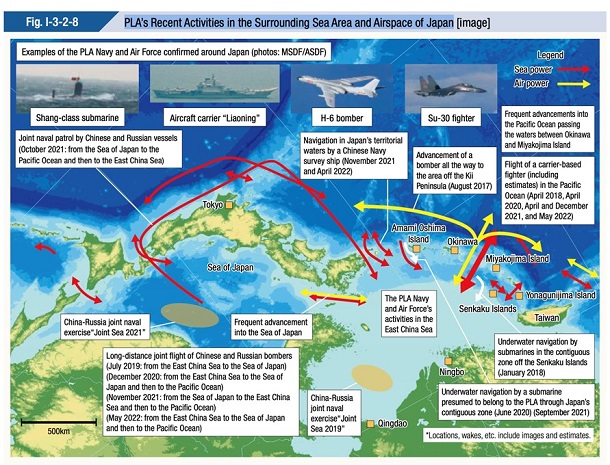 わが国周辺海空域における最近の中国軍の主な活動(令和4年度『防衛白書』英語版)
わが国周辺海空域における最近の中国軍の主な活動(令和4年度『防衛白書』英語版)また、ロシアと日本は第2次世界大戦以来、北海道の4つの島をめぐる領土問題を抱えており、平和条約を結んでいません。そのような中で起こった今回のプーチンによるウクライナ侵略は、中国の台頭と共に、日本人たちに大きなショックを与えています。このショックにより日本人はおそらく戦後初めて安全保障について真剣に考え始めようとしています。
中国へ対抗するべく日本は、アメリカはもちろんこと、オーストラリアやニュージランドとも防衛協定を結んだり、インドとも関係を深めるなど、「自由と民主主義と基本的人権と法の支配」の価値観を共有する国々との提携を図っています。日本の中では、憲法を改正して普通の軍隊を持つべきだという人々や、核武装を考える始めるべきだと主張も表面化してきました。
しかし経済面に関して、中国は我々の最大の貿易相手国であり、平和的な関係の維持は両国にとって重要です。ロシアや中国、そして北朝鮮などを相手に、東アジア地域をいかに安定させるかが、外交面における日本のこれからのチャレンジとなります。
それでは日本の内政の課題はなにでしょうか。歴史的に考えると、それは近代的な国民国家作りだったと言えるでしょう。グローバリゼーションの中、独立した国家をつくり、その上で豊かな社会を追求する。この150年、日本はそれを行なおうと努力してきました。
きっかけとなったのはこれも近代西洋との接触です。1853年、アメリカからペリーがやってきて、砲艦外交で日本に開国を迫りました。この時に、日本はエネルギー革命と通信革命によってグローバル化した世界とはじめて接触します。
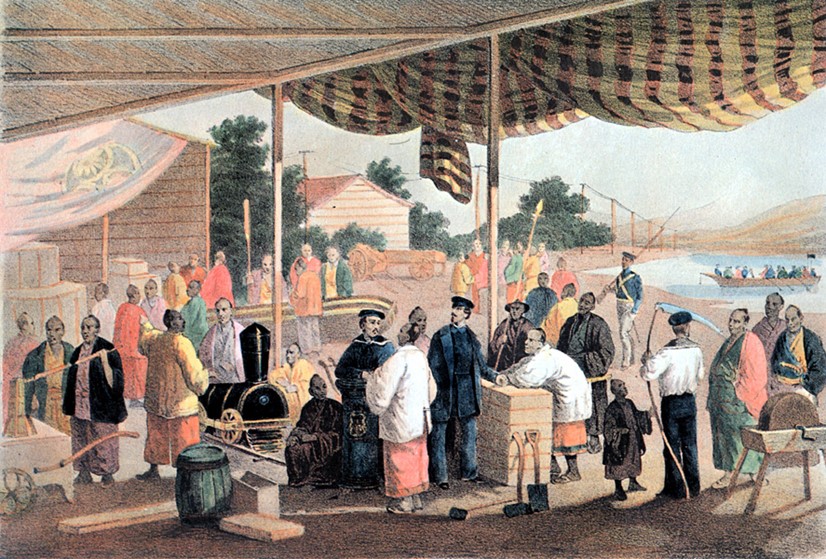 「1854年3月13日 アメリカからの贈り物を届ける」『ペリー提督日本遠征記』(MIT Visualizing Cultures https://visualizingcultures.mit.edu/より
「1854年3月13日 アメリカからの贈り物を届ける」『ペリー提督日本遠征記』(MIT Visualizing Cultures https://visualizingcultures.mit.edu/よりこの図はペリーらの公式記録『ペリー提督日本遠征記』に載っている、アメリカ側が日本にお土産を渡しているところです。さまざまなものがプレゼントとして渡されていますが、侍たちは特に電信と蒸気機関車のミニチュアに関心を寄せました。蒸気と電気の力によって、すなわちエネルギーと通信の革命的技術で世界は一体化したことを侍たちは実感したのです。
次の図は福沢諭吉という当時の若い侍が書いた『西洋事情』という本の口絵です。福沢は通訳としてアメリカやヨーロッパの使節団に随行し、その見聞をもとにこの本を書いたところ、20万部をこえるベストセラーになりました。江戸の人々は新しい世界を知りたがっていたのです。本の口絵にはあたかも現在のインターネットのように電信で結ばれた地球と、蒸気機関が世界のコミュニケーションを拡大している様子が描かれています。文字は「蒸気は人を助け、電気は真実を伝える、世界は一つの家で、人々は兄弟だ」と書いています。
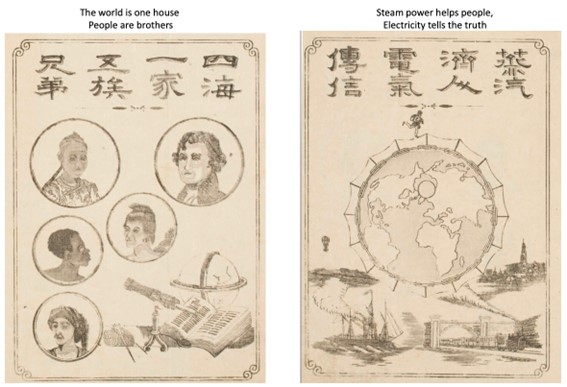 福澤諭吉(1864)『西洋事情 初編』口絵(慶應義塾大学メディアセンターデジタルコレクションよりhttps://dcollections.lib.keio.ac.jp/ja/fukuzawa/a02/3
福澤諭吉(1864)『西洋事情 初編』口絵(慶應義塾大学メディアセンターデジタルコレクションよりhttps://dcollections.lib.keio.ac.jp/ja/fukuzawa/a02/3侍たちはこのエネルギーと電気による世界大のコミュニケーション革命を知り、国を閉ざすのではなく立ち向かわなければならないと決意しました。彼らは刀を捨て、近代的な国家を作り始めたのです。SurviveとResistのための急速な近代化が日本で進んでいきました。
明治維新後、日本政府は西洋各国に若い学生たちを派遣して、技術のみならず、政治制度や思想を含むさまざまなものを学ばせました。彼らは日本に帰国後、各分野でのリーダーとなり近代化に励みました。不平等条約の改正などのためには、政治も近代化して、列強に同じような近代国として認めてもらう必要がありました。今でいう「標準化standardization」の問題です。
そのため、日本は1889年には憲法を制定し、立憲君主国の形を整えます。天皇を西洋各国の国王に相当するもの位置付け、西洋各国の各種制度の背後にあるようにみえたキリスト教にあたるものとして神道を国家宗教とし改良しました。天皇は国家元首となり、国家宗教・神道の神となりました。
一方、2院制の議会も作られました。天皇は元首で「国政を総覧する」のですが、予算と法律については議会の同意が必要となります。その点で近代的な立憲君主制でもあります。また2院のうち、貴族院は天皇の指名による貴族たちの議院でしたが、衆議院議員は選挙によって選ばれました。選挙権は、当初は税金を多く払う金持ちの男性のみに与えられましたが、やがて納税条件は縮小され、1923年には男子普通選挙が実現します。そのような変化の中で、もともと天皇が任命していた首相は、議会で多数を占める政党の代表がつくようになっていきました。疑似的な議院内閣制も成立しかけたのです。
しかし、1920年代末からの世界的不況の中、日本の若い大衆デモクラシーの試みは失敗します。議員たちは金持ちで汚職にまみれていると考えられ、それよりも強くて清潔だと思われた軍部に国民の支持がむかうのです。これは当時のドイツとも似ているのかもしれません。軍部が満州を侵略したのはこの頃で、その後も中国本土への侵略を行いましたが、国民はこれを支持します。「満蒙は日本の生命線」、「欲しがりません勝つまでは」といったキャッチフレーズが日本国中で流行しますが、やがて連合国と戦うことになり敗北したのはお話しした通りです。
敗北後、アメリカの占領下で憲法改正が行われ、国民主権、基本的人権の尊重、平和主義の3つが日本の基本原則となりました。この政体の変化がもたらした外交上の変化は述べたとおりですが、内政も大きく変わりました。天皇は「人間宣言」を行なって神であることを自ら否定しました。彼は国民統合を表すシンボルとなり、神道も国家との特権的な関係を失います。
貴族制度は廃止され、議会の貴族院もなくなりました。首相が議会のみによって選ばれる本当の議院内閣制が憲法上導入されます。女性にも参政権が与えられ、本格的な民主主義が始まりました。
この新しい民主体制のもとで、日本人たちは空襲によって破壊された生活の再建に立ち向かっていきます。人々は経済に注力し、特に朝鮮戦争を契機に急速な工業化が進展します。国内では人々はさまざまな自発的な組織を作りました。そして、それら組織を基盤とした政治が展開します。沿岸部を中心に工業や都市部が発達し、生み出された富は自由民主党によって地方に分配されました。この自民党を中心にした一党優位体制が続き、政治は安定します。このようにして日本は1980年代末から1990年代にかけて、世界第2位の経済的な大国になっていきました。
とはいえ、憲法が変わったからといって人々の心情や組織文化などが急激に変わったとは言えません。人々の集団主義(これは特に戦時中に強化されました)やヒエラルキカルな文化は、会社や家族などの日本の組織には残りました。1950年代から80年代までの日本の急速な経済成長の背後には、官僚制を中心として日本社会が集団して機能するそのような組織文化があったとする議論もあります。そのことはJapan Inc,(日本株式会社)などと言われました。
この経済成長の結果、日本は世界第2位の経済大国となります。軍事的なことは別とすると、1850年代に西洋と出会って以来のキャッチアップに日本は成功したと言えます。しかし、そこから日本は長い停滞期に入っています。経済は停滞し、人口も減少し始めました。
理由はいろいろと考えられますが、西洋にキャッチアップした後の社会像、組織像、人間像などがうまく描けていないことも理由の一つでしょう。今までは西洋というモデルがあったので自分達で特に目的を考えることは要らなかったのです。しかし、追いついた後、どう進むか、どんな社会を作るのかを自分達の頭で考えなければならなくなったとき、今までの組織文化や「常識」が邪魔をしてなかなか変化に対応できなくなっているように私には見えます。
男性中心で、年長者を敬う伝統的な文化は、女性を権力から排除し、若い人々が求める変化を社会が拒絶することと裏腹です。例えば、世界経済フォーラムが発表しているジェンダー指数でも、日本では女性が高い政治的地位につけないこと=権力が男性に独占されていることなどが指摘されています。日本のアニメが描き出すちょっと奇妙な女性像も、カワイイ(Kawaii)という役目を押し付けられがちな日本の女性のカリカチュアなのではないでしょうか。加えて、日本は人口が減少中ですが、その背景にも若者の声よりも老人の声が反映されがちな組織文化が反映しているのかもしれません。
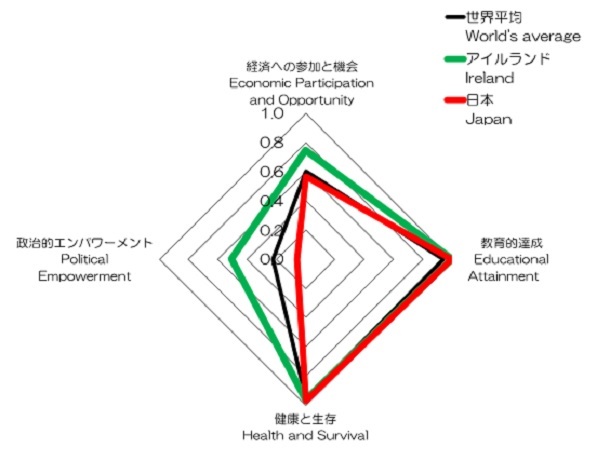 2021年における日本とアイルランドのジェンダーギャップの分野別のスコア(データ:World Economic Forum "The Global Gender Gap Report 2022")
2021年における日本とアイルランドのジェンダーギャップの分野別のスコア(データ:World Economic Forum "The Global Gender Gap Report 2022")その点で、縦型のヒエラルカルな社会からフラットで多様な人々、特に若い人々や女性の声が反映される社会にどのように変化するか、そのことが日本社会のサバイブのために問われていると私は考えます。
しかし、それは山笠のビデオにも見られたようにとてもデリケートな問題です。ビデオにもあったように山笠は博多の自治と深く結びついてきました。しかし一方で山笠は男たちの祭りで女性は山を担ぐことができません。女性たちはおかみさんとして「のぼせモン」の男たちを支えることで参加しますが、やはり表からは、山笠という自治の祭りからは公式に排除されています。
「山笠ははかたん男のまつりったい、東京へいったやつがシェからしかこと言うな!」
「確かにそげんやろうけど、そこをどげんするかが考えらないけんところになっとうとばい!」
いま、我々、日本に暮らす人間たちはおそらく深いところで問われているのだと思います。それはもちろん、日本語についての講義であった、敬語や男性と女性の話し言葉の違いといった文化の根本の部分にもおそらく関係しています。「ガイジン」や「ハーフ」といった言葉を無意識に使う人々の多さにもそれは関係していると考えられます。
このことは次に話すメディアやジャーナリズムも抱える問題です。
日本には古くからの印刷の歴史があります。日本で現存する一番古い印刷物は770年に作られた仏教の経典「百万塔陀羅尼経」です。これは世界最古の紙の印刷物の一つと言われています。
印刷については、特に江戸時代に雑誌や浮世絵などの出版文化が花開きました。庶民も草子屋や貸本屋で多くの本を買ったり借りたりしました。木版の多色刷りの浮世絵なども多く発売され、芝居や旅のお土産として買われていました。政治の批判はできませんでしたが、新聞のようなものも発行されました。かわらばんといいます。かわらばんはニュースを印刷するためスピードを重視した黒一色の印刷物です。今、皆さんの手元にお配りしているかわらばんのレプリカは、戦争を伝えるものと復讐に成功した兄弟を伝えるものです。
政治を報じ議論する近代的なメディアは、江戸時代が終わり、明治になって発達しました。そのいくつかのレプリカもお手元に配っていますが、そのうちの一つが福沢諭吉が発行した「時事新報」です。明治になると、福沢は国民の教育や政治意識に影響を与えるジャーナリズムが大切だと新聞を作りました。日本の新聞ジャーナリズムは1920年代にはある程度の自由だったのですが、1930年代ごろから読者の不安や好戦的な感情、軍部の台頭と戦時下の統制によって、現在のロシアや中国のような国家に寄り添う翼賛型のメディアになりました。
敗戦後は自由になったのですが、戦争中と同じように、行政などの情報を国民に告知するという性格が色濃かったです。戦時下で多くの新聞が政府に指導され統合された影響も残っていたかもしれません。また、日本の新聞はつい最近までほぼ男性だけによって取材・印刷されており、その点では江戸以来のヒエラルキカルな特徴を反映しているとも言えます。
一方、1950年代から始まったテレビ放送は国内の激しい視聴率が特徴です。日本には公共放送が1局と民間テレビ局が5局あります。当時のアメリカですら、民間放送3局でしたから、その多さが皆さんにもわかると思います。この激しい視聴率競争はアニメやバラエティなどの日本的なエンタメを発展させましたが、ニュースもエンタメ化してしまいました。日本の報道番組では効果音や模型がたくさん使われます。政治ニュースもエンタメ化されており、それに付き合わなければならない政治家たちは大変です。このあたりの話も私の論文を参考にしてください。
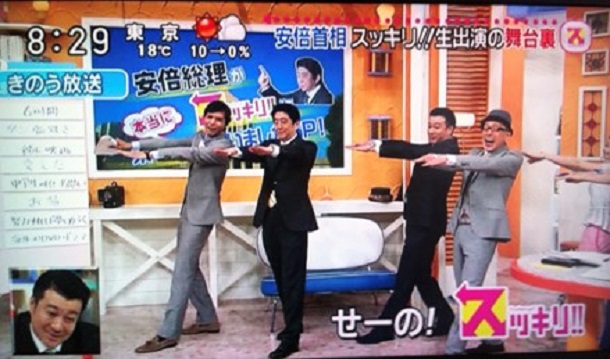 ワイドショーで「ス」のカタカナに擬する安倍晋三総理(当時)=日本テレビ『スッキリ!!』2013年4月17日オンエア
ワイドショーで「ス」のカタカナに擬する安倍晋三総理(当時)=日本テレビ『スッキリ!!』2013年4月17日オンエアただし、このようなヒエラルカルな社会や、それを支える人々の意識は世代の変化と共にゆっくりと変わりつつあります。一昨年行われた東京オリンピックでも女性に対する差別的な発言をした大会の組織委員長が、人々の声によって辞任に追い込まれました。近年では政府も子育てやLGBTQの人々への一定の理解を示しつつあります。日本社会が変わるべきだと考える人たちの意識を反映しているのかもしれません。
そして、この動きに力を与えているのがインターネットの発達です。この20年、インターネット、特にスマートフォンとソーシャルメディアの浸透によって、人々のさまざまな声が可視化すると共に、従来のヒエラルキカルな情報流通形態は破壊されつつあります。それらはフェイクニュースや極右の活動の活発化など、世界に共通する課題も生んでいますが、一方で、世界を一層多様性に富んだ自由でフラットな社会へと移行させています。そして、日本もその流れ・世界の中にあるのです。
日本にとって、この変化への対応は歴史的にとても大きなチャレンジです。しかし、日本はこの変化にうまく対応するものと信じています。なぜならば、われわれには証拠があるからです。それがラグビーです。
ラグビーはご存知のように、特定の地域にあるチームに3年間所属すれば、その土地のナショナルチームに加わることができます。ラグビーは危険なスポーツです。そのスポーツを共にやる仲間、チームのために3年間も命を張った人間はたとえ国籍・肌の色、母語などが違おうが、そのチームの一員だし、そのチームがあるナショナルの一員と見做されるのです。だから、日本のナショナルチームには珍しく、ラグビーのナショナルチームには多くの国籍、そして多くの「人種」の異なるプレーヤーが参集しています。多様な彼らは個人の力を磨くと共に、仲間たちとチームプレーを磨き、前回のワールドカップではあなた方アイルランドにも勝利し、現在も世界ランキングで10位にいます(2023年2月20日現在)。
私がプレーをしていた40年前、なかなか国際試合で勝てなかったジャパンとは大違いです。多様性を取り入れ、フラットな組織を作り、個々の力とチームの力を鍛えた今のジャパンは、強く創造性に溢れ、そして声を掛け合いながらプレーをする、何よりも見ていて楽しいチームです。私にはここにこれからの日本社会のモデルのヒントがあるような気がします。
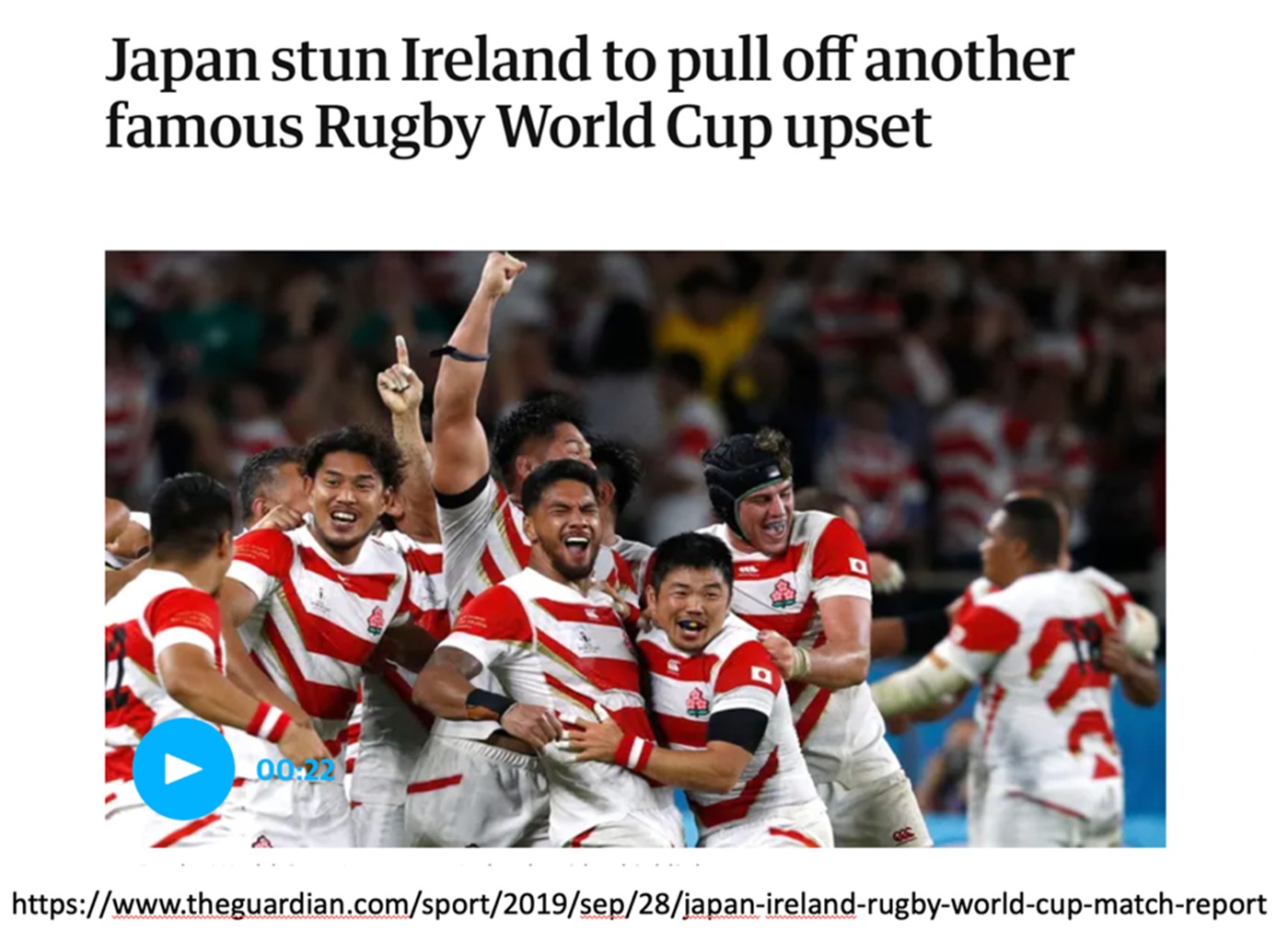 アイルランドに打ち勝ったジャパン!(ガーディアンオンライン2019年9月28日)
アイルランドに打ち勝ったジャパン!(ガーディアンオンライン2019年9月28日)今年2023年は8月からラグビーのワールドカップが開かれます。今日の話を聞いて、日本のこれからの戦いに興味を持たれた方は、ぜひ日本チームの戦いを見てみてください。実は、そのワールドカップの前、3月には高校生の代表チームがダブリンを訪れる予定です。彼らはなぜかトリニティと試合を組んでしまい、アイルランドラグビーのインキュベーターであるUCDを避けてしまったのですが、ぜひワールドカップに行く前に、そして日本に行く前に、彼ら若い世代、君たちと同世代の「日本人」たちの戦いを見にきてください。そしてぜひ日本のチャレンジにも声援をおくってください。
《英語でのオリジナル講義の内容》
Japan’s Call -how we have answered, and how we will answer-
Iwao Osaka
Thank you for the introduction. Firstly, please allow me to introduce myself. My name is Iwao Osaka. I am an Associate Professor at Komazawa University, Tokyo, Japan. I was born in Kyushu, an island in the southern part of Japan. When I was 20 years old, I went to Tokyo, entering Waseda University to study for a degree in German literature but quit my studies there to gain a little business experience. I then re-entered university - this time, the University of Tokyo , and graduated in Law (Political Science). After receiving a master's degree in Law, I was appointed assistant professor in political communication there. I am currently an Associate Professor in the Department of Political Science within the Faculty of Law at Komazawa University. I am the author of “NIHON SEIJI TO MEDHIA -Japanese Politics and the Media” and co-author of “TEREBI SEIJI -Television and Politics” and the textbook, “Political Science” published by the University of Tokyo Press .
As Dr KODATE mentioned in his introduction, this is my second visit in Ireland. I came here 40 years ago and lived in Rathgar for about two months, then went to London and attended a local secondary school there for about a year. The reason I came to Ireland was the work of my late father, Emeritus Professor Osamu Osaka. My father was a professor of English Literature at Kyushu University, with a special interest in Anglo-Irish Literature and writers, poets and playwrights of Irish origin, and was one of the founders of the Yeats Society in Japan. He also translated Brendan Behan's “Confessions of an Irish Rebel” into Japanese. He took a sabbatical here at UCD and University College London with our family in 1979.
My hobbies are theatre, rugby, and cooking. I like both watching, playing and eating! I saw Brian Friel’s play Translations in Galway last year. It was fantastic. And I, myself, performed a play in a pub in Dublin in October which was very fun as well. As to rugby, I played that game for 10 years in my primary and junior high, and high schools and in London as well. And as I have come to the world’s best rugby country, I often go to Leinster games and others. I saw the Six Nations’ Ireland versus France game two weeks ago in the pub and at the public viewing site at the Aviva Stadium. Hearing “Ireland’s Call” with my own ears - fascinating! And I know, UCD have produced a lot of good players, such as Keenan, Porter, Ryan, and of course Ringrose. I am very proud of being here, the incubator of Irish rugby, as a visiting professor.
Perhaps related to my love of rugby and theatre, I am studying political communications of Japanese politics. Political communication is a field that observes and studies how the public, media and political elites communicate or engage with each other. It covers the activities of politicians and political parties, public opinion and propaganda, and the media and their influence and so on, but I am particularly interested in how the public, the media and political elites communicate or interact with each other. In this sense, I am a “fight-watcher” and a “theatre critic” of Japanese politics.
As I have written about the recent campaigns of those three actors of Japanese politics, in English – writings which you can access at Brightspace – and today I would like to take a broad view and talk briefly about the challenges which Japanese politics has been grappling with in recent times.
Politics confronts both foreign and domestic challenges. Therefore, I would like to talk about the history of foreign and domestic issues in Japanese politics, as well as about Japanese journalism, which is currently undergoing major changes.
As you can see from this map, historically relations with China have been particularly important for Japan. China was the superpower of East Asia in the Pre-Modern era. Neighbouring countries were either militarily dominated, or treated as “retainers”, by China. Domination was not only military but also cultural and ethical. It was in China that writing, Chinese characters, and paper - the basis of civilization - were invented, and the grand theory of Confucianism - which would also have a significant influence on Japan – was conceived.
As Nobuko-sensei explained to us, we use three sets of characters in Japan: Kanji, Hiragana, and Katakana. Kanji is the Japanese version of the Chinese characters. Hiragana and Katakana were also created from Kanji. At first, we used the same sounding Chinese letters to represent Japanese words. But we gradually changed Kanji characters to the Hiragana and the Katakana of today.
As Professor Neary pointed out, Japanese people were also heavily influenced by Confucianism. The Samurai's ethics in the Edo period were based on Confucianism. We have also imported various political systems from ancient times. However, it is interesting to note that all of Confucianism, political systems , and others are heavily localized, Japanized, as the Hiragana and Katakana.
By contrast with the experience of other nations in the region , Japan was never dominated militarily by China. Indeed, Japan sometimes challenged and attempted to invade China. During the Ming dynasty in China, around the 13th to the 15th century, Japanese pirates raided and plundered the Chinese coast, and in the 1570s Toyotomi Hideyoshi, after unifying Japan, sent troops to the Korean peninsula to dominate China. Although Hideyoshi’s attempt failed, Japan was sometimes a challenger, and at other times subservient to China.
In the eyes of China, on the other hand, the Japan of that time was considered a barbarian country. An encyclopedia of Ming dynasty described the Japanese as naked, sword-holding savages . In fact, this description of naked Japanese is somewhat accurate. These paintings by Katsushika Hokusai show that the common people of Japan worked and lived nearly naked. This custom remained, I think, in the generation of my grandfathers, and even today we all bathe naked together in hot springs and public baths. Sumo wrestling, a typical Japanese sport, is also performed almost naked, and we also have many “naked” festivals. Let's take a look at a festival in my home town of Fukuoka in Kyushu, Japan.
As the last speaker from Taiwan in the footage said about the Samurai spirit, some kind of barbarianism or war-like sprits, may still remain in Japanese people. However, this cultural trait was considered embarrassing by China and Korea, and was a reason why Japan was viewed as inferior and uncivilised.
This perception and relationship continued for thousands of years, but there was a major change in the second half of the 19th century, when we came into regular and sustained contact with the West . While China, confident in its own ways, showed some resistance to modernise, Japan quickly accepted it and achieved rapid modernisation.
Japan then fought China for control over the Korean peninsula and won in 1895. This was a huge change in the East Asian world, as a country perceived by China as barbarian had defeated a “superpower” there. Japan also fought and won against Russia in 1904-1905. This was the first victory by an Oriental over a Western power and was greatly appreciated by the Asian people, who were suffering from Western domination. Japan also participated in World War I, defeating German soldiers in China.
However, Japan colonised Korea in 1910 and subsequently invaded north-east China (Manchuria). In the 1930s it established a puppet state (“Manchukuo”) in Manchuria, and in 1937 Japan finally began to a full invasion into China – rather as Russia in 2014 first invaded the Crimean Peninsula and more recently mainland Ukraine.
After the invasion of mainland China, Japan finally started a war against the USA, and invaded the East and South-East Asian colonies of Britain and the Netherlands in 1941, occupying French Indochina nearer the end of Word War II.
At first, we won. We took possession of the British-controlled Malaya and Singapore and sank the Prince of Wales. But the situation turned bad soon after, and in 1945, shortly after the atomic bombs destroyed the cities of Hiroshima and Nagasaki, Japan surrendered unconditionally.
Aspiring sincerely to an international peace based on justice and order, the Japanese people forever renounce war as a sovereign right of the nation and the threat or use of force as means of settling international disputes.
In order to accomplish the aim of the preceding paragraph, land, sea, and air forces, as well as other war potential, will never be maintained. The right of belligerency of the state will not be recognized.
After defeat, Japan was occupied by the United Nations, led by the Americans, and became a pacifist state. Under US influence, we amended the Constitution. And Article 9 of the new Constitution abolished the armed forces and denied the right of belligerency. At the time, the people were tired of war and supported this idea. In exchange for allowing the US military to establish frontline bases on our territory, Japan received security guarantees that it would be protected by the US.
Constitution of Japan Article 9. RENUNCIATION OF WAR;
Aspiring sincerely to an international peace based on justice and order, the Japanese people forever renounce war as a sovereign right of the nation and the threat or use of force as means of settling international disputes.
In order to accomplish the aim of the preceding paragraph, land, sea, and air forces, as well as other war potential, will never be maintained. The right of belligerency of the state will not be recognized.
As the Cold War progressed, Japan also created a military organisation, called the Self-Defense Forces of Japan, but it did not possess any 'offensive' weapons, such as long-range missiles, for the purpose of self-defence only. Japan chose to leave security to the US and concentrate on the economy. Later, by the end of the 1960s, that defeated country, Japan had grown into one of the world's leading economic powers.
But times have changed: the Cold War ended. Since then, the world has become disorderly. With the rise of China and India, the relative power of the US has been decreasing, and as a military force, the US can no longer commit itself to the world in its entirety. The power of the West has also weakened.
As for Japan, China, Russia, and a nuclear weapons-equipped North Korea are the primary sources of concern. Having adopted a socialist market economy, China rapidly increased its economic power in the 1980s and 90s. And with its growing economic power, China is thought to be expanding its territorial ambitions. We see many territorial conflicts between China and neighboring countries, including Japan. Tensions with Taiwan are also clearly increasing.
In addition, Russia and Japan have had territorial disputes since World War II and have not signed a peace treaty yet. Putin's recent invasion of Ukraine, which took place in this context, along with the rise of China, has come as a great shock to the Japanese people. The Japanese are beginning to think seriously about our national security, perhaps for the first time since the end of the war.
To counter China, Japan is trying to form alliances with countries that share the values of liberal democracy, including defense agreements with Australia and New Zealand - not to mention the US - and to foster a deepening relationship with India. Some Japanese argue that we must amend the Constitution to have a regular army, and some even say that Japan should have nuclear weapons.
However, China is our largest trading partner. So, maintaining peaceful relations is vital for both sides. So stabilising East Asia and establishing a peaceful atmosphere in that region are the great challenge for Japanese diplomacy.
Let us now turn to internal politics. What was the main challenge facing Japan in the domestic political sphere? We can say that it is the creation of a modern nation-state with a prosperous society.
The encounter with the modern West was the tipping point: as Dr. Downey explained, in the 1850s, Commodore Matthew Perry came from the USA and forced the country's opening through gunboat diplomacy.
This picture shows Perry handing over his presents to the Japanese Samurai at Yokohama in 1854. The Samurai were interested in the telegraph and a miniature steam locomotive. At this moment, the Samurai realised that the power of steam and electricity united the world.
The Samurai learned of this global communication revolution with energy and electricity uniting the world as one. They put down their swords and began to build a modern state: rapid modernisation with the objective “Survive and Resist” started in Japan.
This picture is from the cover of a book entitled “Seiyo Jijo” (Western Affairs), written by Yukichi Fukuzawa, a young samurai scholar introduced by Dr. Downey last week. This book was first published in 1866 and became a bestseller, selling over 200,000 copies. The cover illustration shows a world connected by telegraph (like the internet) and the steam engine expanding global communication. The text reads: “Steam helps people, electricity tells the truth, the world is one house, and people are brothers.”
The Japanese Government sent young scholars to the West to learn not only technology, but also many other things, including political systems and ideas. On their return to Japan, they became leaders in their fields and worked hard to modernise Japan.
In order to revise unequal treaties, it was necessary to modernise the political and legal systems and be acknowledged by the powers as a modern nation. In 1889, Japan made a constitution – commonly referred to as the “Meiji Constitution ” – in which the State was designated a constitutional monarchy. It gave the Emperor (Tennō, or Mikado), the same status as kings in the West, and it established Shintoism as the State religion , as , for example, the Anglican Church had in the United Kingdom . The Tennō was made the Head of State but also the Shinto God.
Meanwhile, a bicameral parliament - a two chamber parliament with an Upper House and a Lower House - was also created. The Tennō was the head of state, but the budget and laws required the approval of Parliament; of the two Houses, the KIZOKU-IN was the House of Peers, nominated by the Tennō, while members of the SHUGI-IN, House of Representatives, were elected. Initially, only rich men who paid a lot of tax were given the right to vote for the SHUGI-IN, but the tax requirement was eventually reduced and universal male suffrage was achieved in 1923. In the context of these democratic changes, the Prime Minister, constitutionally appointed directly by the Tennō, was replaced by a leader of the party having a majority in the SHUGI-IN. Through this reform, a parliamentary cabinet model was largely established – albeit not a complete version of that model.
However, during the global recession that began in the late 1920s, Japan's attempts as a young mass liberal democracy failed. The “clean” and powerful military received more public support than the “dirty” legislators – a development somewhat comparable to that in Germany at the time. It was around this time that the Japanese military invaded Manchuria and subsequently launched a full-scale invasion of China . The Japanese people and the Japanese media supported these events enthusiastically. They believed the army's propaganda that it was for the survival of Imperial Japan. However, as I told you, we eventually started to fight the Allies and were defeated.
After the defeat, the Constitution was amended during the US occupation, and we adopted three basic principles: sovereign power resides in the people; respect for fundamental human rights; and pacifism. I have referred to the external factors caused by this constitutional change, but domestic politics also changed dramatically. The Emperor issued a 'Declaration of Humanity', saying he was not a god, and became a symbol of national unity. And Shintoism ceased its association with the State.
The aristocracy was abolished, and the KIZOKU-IN disappeared. The Prime Minister was elected solely by Parliament. Women were given the right to vote, and a complete democracy was constitutionally established.
Under this new democratic regime, the people in Japan started to rebuild their lives destroyed by the war. People focused on the economy. They formed various voluntary organisations and politics developed based on these organisations. The wealth generated by factories in coastal areas of the Pacific was distributed to rural areas. In the 1960s, the Liberal Democratic Party established a one-party dominant system, and political stability was achieved. Please read my article on Brightspace for more information regarding the LDP's politics and subsequent changes. In this manner, Japan became the world's second-largest economic power in the late 1980s and early 1990s.
But one cannot say that people's feelings and the culture of society changed quickly because of the change in the Constitution. Popular collectivism, which was pushed even more during the war, and the culture of having a hierarchy remained entrenched in Japanese society, companies and families. Some people say that Japan's fast economic growth from the 1950s to the 1980s was due to a culture of organisation in which Japanese society worked as a whole, with the bureaucracy at the center. ‘Japan Inc.’ was the name for this.
But after reaching its peak in 1990s, Japan has entered a long period of stagnation. The economy has averaged very low growth rates for three decades, and recently the population began to decline.
One of the reasons for this is that our organizational culture is a barrier. A traditional culture that is male-centric, hierarchical, and respectful of elders rejects the notion of women holding positions of power and causes society to reject the changes that are demanded by younger generations. The gender index of the World Economic Forum (WEF) has pointed out the inability of women in Japan to attain high political positions and the more limited economic participation and opportunities for Japanese women. The strange female images in Japanese anime and manga are caricatures of Japanese women, who are frequently forced to play the “kawaii” (“cute”) role.
As Dr. Kodate mentioned last week, Japan's population is declining, which may give rise to the aspect of organizational culture that prioritises the voices of the elderly rather than those of the younger generations.
In this regard, the challenge for the survival of Japanese society is to transition from a vertical, hierarchical society to one that is horizontal, flat, open, and diverse - one that could reflect the voices of the various sections of the population.
Of course, it is a very delicate issue: as we saw from the Yamakasa festival footage, male dominance is firmly rooted in customs. It also has a relationship with some of the cultural fundamentals, including the language, that Nobuko-sensei explained to us, such as Keigo and the differences between male and female speech and so on.
We can also find the same difficulty in the Japanese media and journalism. Printing has a long history in Japan. The oldest printed material preserved in Japan is a Buddhist scripture of 1500 years ago, which is one of the world's oldest paper printings.
With magazines and ukiyo-e (Japanese woodblock prints), a publishing culture flourished, particularly during the Edo period. Ordinary people purchased or borrowed many books and magazines from bookstores. As souvenirs for plays and journeys, people purchased ukiyo-e. And some newspapers began to be published on an occasional basis, though they could not engage in political criticism. They were known as “Kawaraban”. Kawaraban rarely used colors; they were just black ink on white paper to print news quickly. The replicas of Kawaraban that you see are all actual sizes. One tells the story of brothers who successfully took revenge on their father, and others cover wars.
Modern newspapers covering politics and published daily developed in the Meiji era. I bring some replicas of old Japanese newspapers as well. One of them is the Jiji Shimpo, published by Fukuzawa Yukichi. Japanese newspaper journalism had a degree of freedom in the 1920s. But by the 1930s, with the rise of the military and a shift in public opinion, they became flatterers or advocates of the state, like those of Russia and China today.
After the war, they became free but still tended to disseminate what the administration wanted to report. In this respect, they also reflect the hierarchical nature of postwar society. Japanese newspapers are still very much “men's organisations”.
On the other hand, Japanese television, which began in the 1950s, is characterised by fierce competition for ratings, with one public broadcaster and five commercial TV stations. This intense competition for ratings led to the phenomena of Japanese-style entertainment, such as animes and variety programs. This fierce competition extends to news programs. And to gain ratings, they began to add music and sound effects to news footage and even to use puppets of politicians. Political news has also become entertainment, and the politicians who deal with it have a hard time. For more information on this topic, please see my paper.
However, this hierarchical society and the attitudes of the people who support it are slowly changing as generations change. At the Tokyo Olympics held in 2021, the head of the organising committee, who made sexist remarks about women, was forced to resign by pressure from public opinion expressed via the Internet. The government is also showing a certain understanding towards problems faced in raising children and issues affecting LGBTQ people. This may reflect the awareness of those who believe that Japanese society needs to change.
And giving strength to this movement is of course the development of the Internet, especially the spread of social media in recent years. The Internet is making popular opinion visible and destroying traditional hierarchical forms of information distribution in Japan. Certainly, social media generates problems, such as fake news and the rise of far-right activities. But I still believe Japan is gradually transforming into a more diverse, open, and flat society.
I know this is a huge historical challenge, but we have the evidence in a “forerunner”. That is rugby. In rugby, as you know, if you are a member of a regional team for three years, you can join the national team there. Players who have dedicated their lives to their team for three years are considered to be on an equal footing with their native team-mates. So , by contrast with Japanese national teams in other sports, the national rugby team includes players from a diverse range of nationalities and ethnicities.
The Japanese national rugby team developed their individual skills and initiative, as well as focusing on team play. With that increased diversity, we could win the world's strongest rugby team at the last World Cup four years ago, and as of now, the “Brave Blossoms” rank 10th in the world.
When I was playing rugby in London forty years ago, the Japanese team was very weak. We were defeated by Scotland 0-120. However, Japan’s national rugby team has now welcomed diversity, established a flat organizational structure, developed individual and team strength, and become strong and creative. Above all, our play is fun to watch. And I believe they are the forerunners of Japanese society in the future.
This year the Rugby World Cup will be held in August. If you are interested in Japan's upcoming challenges, you should observe the rugby matches first. And, just to mention it, you don’t have to wait until August, as the Japan National High School Rugby team will visit Dublin next month, in March. They will have a number of games in Dublin. The schedule is here. I'm curious why they wouldn't play with us, Ireland's rugby incubator. Maybe they are planning it right now. But in any case, please come and watch – and cheer on - these youngsters facing their challenge, before you go to the World Cup and to Japan.
Thank you very much.
有料会員の方はログインページに進み、朝日新聞デジタルのIDとパスワードでログインしてください
一部の記事は有料会員以外の方もログインせずに全文を閲覧できます。
ご利用方法はアーカイブトップでご確認ください
朝日新聞デジタルの言論サイトRe:Ron(リロン)もご覧ください